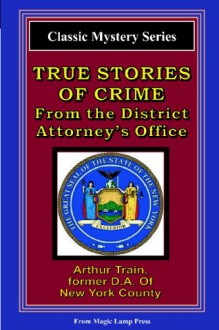
I downloaded this ages ago, during a long Project Gutenberg browsing session. I didn't really know much about it or its author, Arthur Cheney Train, but it was free, and I was curious about the sorts of crimes that were considered noteworthy back in 1908.
According to Wikipedia, Train became an assistant in the office of the New York District Attorney in 1901. In 1908, when this book was first published, he left to open a general law practice. By that time, he had already been writing fiction for several years. His most popular character was a lawyer named Ephraim Tutt.
This book was a collection of 11 cases, covering such things as check forgery, a missing Stradivarius, murder, and various abuses of trust on the part of lawyers and people who deal with others' money (stockbrokers, bankers). At some point, I'd liked to give Train's fiction a try, because his explanations of the legal aspects of the various cases were usually pretty clear. At times, I felt a little like I was watching Law & Order: Early 20th Century, complete with Train occasionally saying something to the effect of “the law was carried out, but was justice really done?”
One of my problems with this book was that some of the cases were very hard to follow. Train tried to lay out a lot of information in a small number of pages, and I was sometimes confused about who did what and why. It probably didn't help that I'm a modern-day reader. I'm fairly certain at least a couple of the cases Train discussed were very high profile at the time, and I think he assumed that his readers would know at least the basics of what went on. Also, sometimes I just didn't know the technology – the chapter on wire-tapping (involving telegraphs) was one such example.
As is the case with most anthologies, some of the stories were more interesting than others. I most enjoyed “A Study in Finance” and “The 'Duc de Nevers.'”
“A Study in Finance” looked at the slow downfall of a clerk who succumbed to the temptation of stealing bonds. He gave them to a man who swore the price of cotton was going to jump any day now – he'd quickly earn them both a lot of money and then give the bonds back. Except it didn't work that way. By the end, the clerk had stolen over half a million in bonds. While the downfall of the clerk was interesting enough, Train's perspective on the case made this chapter a good read, too. Although Train didn't believe that what the clerk did was right, he definitely had sympathy for the man. The clerk was underpaid, regularly had access to millions in bonds, and banks didn't have adequate checks in place to keep theft from happening – not until after this massive theft was discovered, at any rate.
“The 'Duc de Nevers'” rambled quite a bit, so much so that I found myself skimming portions of it. In this chapter, Train met a prisoner who swore he was Charles Julius Francis de Nevers, the Duc de Nevers. De Nevers told his entire story, and even presented documentation (lots and lots of documentation) proving his identity. Train, caught up in his story, believed him. The overwhelming amount of proof De Nevers had of his identity had the opposite effect on me – I thought he was overdoing it a tad. At any rate, the story became very twisty. This chapter didn't present any answers as to who De Nevers really was - he seemed so utterly convinced of his own false identity that I couldn't help but wonder if the man was mentally ill.
Those were, for me, some of the best chapters, but I also enjoyed reading about the woman who forged checks (“The Woman in the Case”) - her trial sounded like an absolute circus. The final chapter, “A Case of Circumstantial Evidence,” also made for a good, if sad, read.
(Original review posted on A Library Girl's Familiar Diversions.)

 Log in with Facebook
Log in with Facebook 





